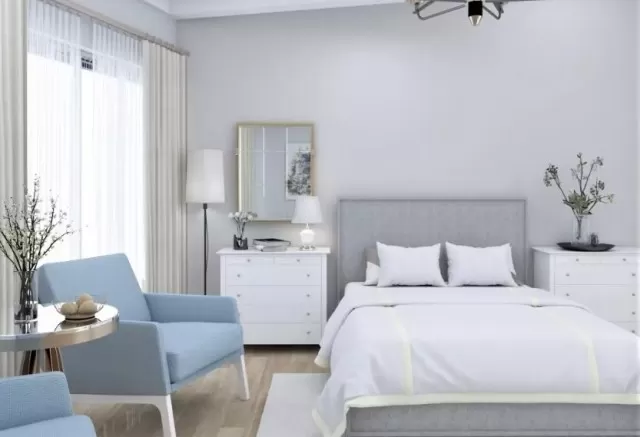These changes will help create a more comfortable and allergen-free living space, allowing you to better cope with pollen allergies and improve your overall well-being.
It’s not just your imagination; pollen allergy season has been worsening each year due to hotter temperatures, leading to stronger and longer-lasting pollen from various sources like trees, grasses, flowers, and weeds.
Common pollen allergens include ragweed, birch, sagebrush, cedar, and oak. While we can’t control the weather, there are steps we can take to manage our indoor environment.
According to Tania Elliott, M.D., a spokesperson for the American College of Allergy, Asthma & Immunology (ACAAI), the first line of allergy treatment is avoidance.
Consulting an allergist can help identify specific triggers, such as pollen, dust mites, or pet dander.
Ways to Minimize Pollen Allergies

Once you know your triggers, you can make simple yet effective changes to allergy-proof every room in your home.
Limit Outdoor Activities in the Morning: If you are prone to pollen allergies, try to stay indoors during the morning hours when grass pollens are most prevalent in the air.
By avoiding outdoor activities during this time, you can reduce your exposure to allergens.
Be Cautious When Mowing Grass: If you need to mow the lawn, consider wearing a mask to minimize your exposure to grass pollens.
Alternatively, delegate the task to someone else or hire a professional lawn care service. This way, you can avoid direct contact with the allergens released during mowing.
Keep Windows Closed: Keep the windows in your home and car closed during the pollen season.
This simple step can prevent pollen from entering your living spaces and provide a pollen-free environment indoors.
Choose Indoor Activities: Instead of having picnics in parks or rural areas during the pollen season, opt for indoor activities.
Indoor settings can offer a more controlled environment with reduced exposure to outdoor allergens.
Monitor Pollen Forecasts: Keep track of pollen forecasts in your area.
Many weather websites and apps provide daily pollen counts to help you plan your outdoor activities accordingly. On high pollen days, consider staying indoors or taking allergy medication before heading outside.
Use Air Purifiers: Invest in high-quality air purifiers for your home and car.
These devices can help filter out pollen and other allergens from the air, improving indoor Air Quality and reducing allergy symptoms.
Clean and Change Clothes After Outdoor Activities: After spending time outdoors, make it a habit to change your clothes and shower to remove any pollen that might have adhered to your skin and clothing.
This will prevent pollen from being transferred to your furniture and bedding.
Take Allergy Medication: Consult with your healthcare provider and consider taking over-the-counter or prescription allergy medications to alleviate symptoms.
Antihistamines, decongestants, and nasal corticosteroids are commonly used to manage pollen allergies.
Use Saline Nasal Rinses: Saline nasal rinses can help flush out allergens from your nasal passages, providing relief from congestion and sneezing.
Use a neti pot or a saline nasal spray according to the manufacturer’s instructions.
By following these steps, you can significantly reduce your exposure to pollen and effectively manage your pollen allergies, allowing you to enjoy the outdoors more comfortably during allergy season.
However, if your symptoms persist or worsen, it is essential to consult a healthcare professional for personalized advice and treatment options.
Ways to Reduce Allergens in Home

Limit Outdoor Allergens at Home.
Prevent outdoor allergens from entering your home by creating a designated spot for removing shoes in the entryway.
Implementing a no-shoes policy and using an indoor mat to catch footwear will help keep your living space cleaner. Also, place a doormat outside to wipe off your shoes before entering.
Shed Layers and Isolate Dirty Clothing.
For serious allergy sufferers, remove as much clothing as possible upon entering the house.
Leave jackets, scarves, and hats in the entryway or closet. Consider keeping a hamper nearby to isolate dirty clothing until laundry day, especially after outdoor activities.
Wash Your Face and Eyelids.
If showering after coming indoors isn’t feasible, at least wash your face and eyelids with a mild, fragrance-free cleanser, especially if pollen tends to cling to your lashes.
Choose Allergen-Resistant Flooring.
Opt for wood or tile flooring, as they are ideal for allergy sufferers.
These flooring types are less likely to harbor mold, a common indoor allergen. If you prefer rugs, choose short-pile or no-pile styles made from materials like polypropylene, sisal, or wool, as they are easier to clean and resistant to mold.
Regularly Vacuum Your Floors.
Vacuum your floors regularly and thoroughly using slow, deliberate passes.
Use a Vacuum Cleaner with HEPA Filtration to trap even the tiniest particles, and consider getting deep-cleaning for wall-to-wall carpets.

Clean Fabric Upholstery Frequently.
Fabric upholstery can accumulate allergens, so consider using machine-washable slipcovers for your sofas and launder them weekly.
If possible, opt for leather or faux leather furniture, as they are easier to clean.
Be Mindful of Houseplants.
Choose indoor plants carefully, as some may promote mold growth or collect dust.
While most indoor plants don’t produce the type of pollen that affects seasonal allergy sufferers, there could be cross-reactivity between indoor plants and outdoor allergens.
Use an air purifier.
Consider using an air purifier in your bedroom, especially if you wake up congested.
Look for a unit with a high Clean Air Delivery Rate (CADR) and a HEPA filter, as they are effective in trapping tiny allergens.
Minimize Dust in the Bedroom.
While eliminating all dust is impossible, take steps to reduce it in your bedroom.
Use dust-mite-proof encasements for your mattress and pillows, and wash your bedding weekly in the hottest setting. Dust from top to bottom to prevent it from resettling.
Run the Air Conditioner.
Keep windows closed, especially during allergy season, to prevent pollen from entering your home.
Use the air conditioner to keep your bedroom sealed and comfortable, but don’t forget to change or clean the filters regularly for better air quality.
*The information is for reference only.